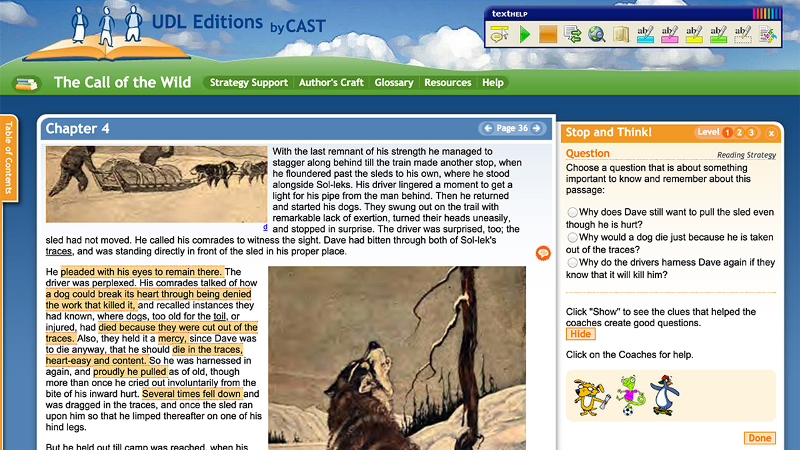UDL Editions™

Because of their flexibility and malleability, digital technologies — especially web-based tools — dramatically expand options for providing Universal Design for Learning (UDL) supports as compared with exclusively print-based media.
Created in partnership with the Google Literacy Project and Carnegie Corporation of New York to celebrate World Book Day in 2008, CAST launched UDL Editions of classic public domain texts, including a short story, sonnet, speech, and more, from world literature to demonstrate the power of technology to transform texts in a way that responds to the needs of all kinds of learners.
UDL Editions brought seven classic texts into a scaffolded digital reading environment with flexible supports for three facets of learning: understanding content, building skills, and having fun. Six of the texts could be viewed in English, and one in Spanish.
The tool reached a target audience of users 10 years of age or older. To incorporate UDL, readers chose their text and level of support desired: minimal, moderate, or maximum, and accessed multimedia resources for background information and enrichment activities for further learning.
Supports included:
- Glossary words
- In-context explanations of idioms and literary devices
- Stop-and-think prompts
- Animated coaches providing hints and support
- Image descriptions
- “Build-your-own” activities to understand the authors’ craft
- Interactive maps
- Teacher resources
In addition, a toolbar contributed by Texthelp offered:
- Text-to-speech read-aloud
- Dictionary and encyclopedia links
- Highlight-and-gather
- Translations between English and Spanish
Varied literature was selected to show how a UDL-supported and scaffolded environment can support content across the curriculum and across grade levels. With powerful new technologies and UDL principles, old classics became smart, reader-friendly texts that opened up a new world of reading to learners with diverse abilities, interests, and skills.
UDL Editions and other literacy research project work conducted by CAST informed the development of UDL Studio, which guides and supports educators to build their own UDL-supported materials.
For more information about UDL Editions, contact Kristin Robinson.

UDL Editions in Research
Universal Design for Learning in the Classroom: Practical Applications, published in 2012, uses UDL Editions as a case study to discuss how the principles of UDL apply to reading comprehension, teaching, and learning in Chapter 3: Reading Strategy Instruction, Universal Design for Learning, and Digital Texts: Examples of an Integrated Approach.
In particular, it addresses the what, how, and why of reading:
- What: What are the words on the page/screen, and what do they mean?
- How: How does the reader make sense of the text?
- Why: Why should the reader care about the text?
